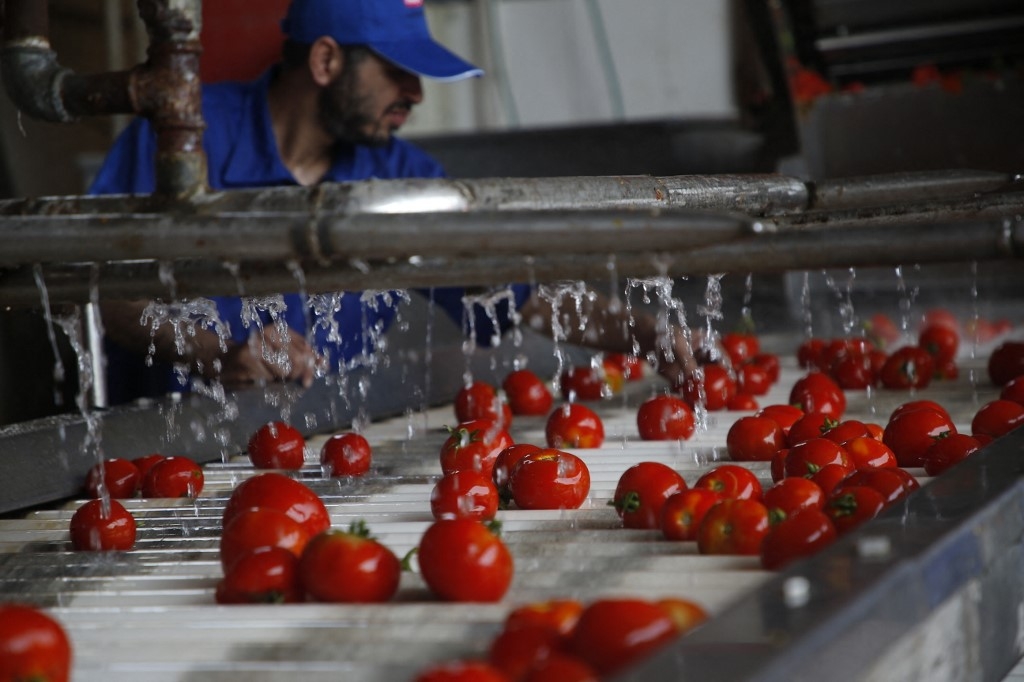Israel says Gaza farmers must remove crowns from tomatoes if they want to export them

Israeli authorities have placed a new restriction on Palestinian tomato farmers in the besieged Gaza Strip, one which will lead to their shipments of the fruit to markets in the occupied West Bank and Arab countries rotting more quickly.
Palestine’s Ministry of Agriculture said on Wednesday that Israel had asked the farmers to remove the crown of the tomato - namely the sepal and pedicel of each tomato that grows from the flower and keep the fruit attached to the stem - before they will allow trucks carrying the fruit to pass through the Karm Abu Salem crossing.
There was no immediate explanation from Israeli authorities as to why they had asked for the removal.
Israel has imposed a land, air and sea blockade against the Gaza Strip since 2007, controlling the movement of lorries passing to Israel and the West Bank through al-Mintar, Awdeh and Karm Abu Salem, three crossings administered by the Israeli army and dedicated to commerce.
The ministry said 110 tonnes of various vegetables and fruits were allowed to pass from the Gaza Strip to the West Bank on Wednesday, having been blocked by Israel for the past 43 days.
The ministry said the new Israeli rule for tomatoes was “impossible” to meet and said it rejected “the Israeli occupation's new obstacles, and its condition to change the standards of marketing some agriculture products, [to pass] through the Karm Abu Salem crossing”.
It also added that customers prefered buying tomatoes with the crown on them, individually or as a bunch.
A Palestinian farmer from Gaza complained in a video posted on social media that removing the crown would both take extra time and lead to the tomato going off quicker.
He said that his tomato crop to be shipped to Ramallah, Nablus, Jenin and Hebron would have to wait in the trucks for three days at the crossing before being allowed to pass.
“And by the time it finally passes, from the point where we removed the sepal, the tomato will start to go off and rot… When we deliver the tomato [to the market] it will already be rotten and no one will buy it,” he said, adding that he would also need extra workers to meet the new Israeli restrictions.
'Improper use of pesticide'
Israel has previously blocked tomatoes from being shipped to the West Bank and Arab markets citing “an improper use of pesticide”.
Israel and Palestinian armed factions, including Hamas and Islamic Jihad, fought for 11 days in May after Israel's violent storming of al-Aqsa Mosque and a crackdown on Palestinian protesters in the West Bank, occupied East Jerusalem and mixed cities inside Israel.
Palestinian farmers in Gaza, who rely financially on shipping their crops - particularly strawberries, flowers, tomato and cherries to Palestinian and Arab markets - say they have sustained a total loss of more than $16m since May following Israel's closure of the crossings.
Since May, Israel has blocked almost 6,500 lorries from entering Gaza that were carrying shipments of manufacturing oils, tyres and car parts among other goods, while a further 300 truckloads of vegetables, clothes and furniture were refused permission to exit the enclave, according to the Gaza District Chamber of Commerce.
Palestinians in the besieged Gaza Strip already suffer from a lack of essential materials for construction, medical purposes, infrastructure and manufacturing.
Middle East Eye delivers independent and unrivalled coverage and analysis of the Middle East, North Africa and beyond. To learn more about republishing this content and the associated fees, please fill out this form. More about MEE can be found here.






